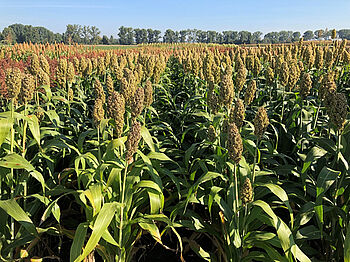Inhalt: Project details
Duration
10.2022 – 12.2025
Contact person
Dr. Andreas Stahl (RS)
Tel: +49 (0)3946 47 3600
andreas.stahl@julius-kuehn.de
JKI Project team
Institute for Resistance Research and Stress Tolerance (RS)
- Dr. Gwendolin Wehner
- Dr. Dragan Perovic
- Dr. Christiane Seiler
- Dr. Christiane Balko
Institute for Crop and Soil
Science (PB)
Institute for Strategies and
Technology Assessment (SF)
Project partner
- Justus Liebig-Universität Gießen
The project "SORGHUM" is funded by the Federal Ministry of Food and Agriculture as part of the German Climate Protection Programme 2022.
Inhalt: Increased humus production through the cultivation of sorghum in Germany as an active contribution to climate protection (SORGHUM)
Background:
The SORGHUM project aims to investigate the potential of cultivating Sorghum bicolor (L.) as an alternative C4 plant in Germany and to evaluate the respective climate change mitigation potential. Therefore, the hypothesis is tested, whether an increased humus reproduction and respective active carbon sequestration supports an improved greenhouse gas (GHG) balance of crop production. Simultaneously, the resource efficiency of crop production is analysed.
Since the major challenges of larger Sorghum cultivation in Germany are insufficient cold tolerance and non-adapted maturation of sorghum, the project focuses on the genetic base of these two traits towards identification of desirable allelic variants and development of molecular breeding tools. Those can then be used as a selection tool during the breeding process, which further supports practical sorghum cultivation. As a result, the potentials of a more widespread sorghum cultivation can be utilized faster and more effectively.
Objectives:
The project aims to act as a catalysing factor for sorghum cultivation and profit from the rapid developments in the field of plant genetics (availability of sequence information, genome wide markers, prediction models). With the help of training populations and genome wide marker information, genomic prediction models for cold tolerance, early maturity, yield, carbon fixation and biomass of crop residues are developed. In addition, selected test hybrids are studied under drought conditions to assess soil carbon fixation under current and changing climate conditions. Process-based crop growth models depicting the whole soil-plant-atmosphere-system in daily steps and the simulation of different sorghum genotypes in different cultivation regions over several years allows an evaluation of yield potential, soil carbon sequestration and nitrous oxide emissions during the growth period. By extensive GHG accounting the potentials for climate change mitigation are analysed in detail and quantified respectively.

